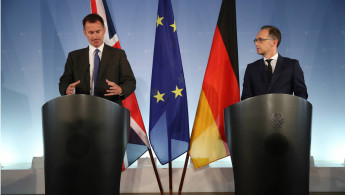In angry letter, UK 'pressures' Germany to resume Saudi arms sales
Britain's Foreign Minister Jeremy Hunt has urged Germany to rethink halting exports to Saudi Arabia, penning an angry letter to his counterpart Heiko Maas saying the decision could jeopardise crucial arms deals with Saudi Arabia.
"I am very concerned about the impact of the German government's decision on the British and European defence industry and the consequences for Europe's ability to fulfil its NATO commitments," the British minister wrote according to German newspaper Der Spiegel.
Germany banned exporting arms to Saudi Arabia in October following the Saudi state-sanctioned murder of dissident journalist Jamal Khashoggi in the kingdom's consulate in Istanbul.
As German parts for missiles and fighter jets cannot be sent to Saudi Arabia under the ban, the UK may not be able to fulfil many of its lucrative arms contracts with the Saudi regime.
The ban is total and affects even miniscule parts in arms produced elsewhere. Both the Eurofighter Typhoon and Tornado fighter jets appear to be affected by the ban, as well as the Meteor air-to-air missile which accompany Typhoon jets.
Britain-based arms maker BAE Systems is up in arms over the German ban which will affect more than 500 of its suppliers, according to the report.
In his letter to Maas, Hunt warned that BAE has been threatened by compensation claims as it would be unable to fulfil its contracts with Riyadh.
The British foreign minister pleaded with Maas to exclude "major European defence projects" such as the Typhoon and Tornado from the embargo. Otherwise, he said, Britain would lose confidence in Germany as a partner.
Britain has faced a heavy backlash for its continuous arms sales to Saudi Arabia, which is currently waging a brutal war in Yemen which relies heavily upon British-made weapons. Human rights organisations have called for a ban on these sales.
It is not only a problem for BAE if it has to renege on its contracts with Riyadh. When Saudi Arabia agreed to purchase 72 Eurofighter Typhoons in 2007, it was under a government-to-government contract, which means the UK is also liable for the delivery of the contract.
BAE is also responsible for ensuring the steady flow of necessary parts for maintenance and support.
The Royal Saudi Air Force still has enough spare parts to repair its fleet, but could soon run into problems with its operational capability if Germany continues to block deliveries, The Financial Times reported this week.
Missile deliveries to France, Spain, Italy and Sweden had also been delayed, Hunt claimed, which he said would affect NATO's operational capabilities.
The ban has also had a significant effect on the German arms industry, which reportedly expects losses of €2.3 billion ($2.6 billion) by 2026.
Hunt will meet with Maas in person on Wednesday during a visit to Berlin.





 Follow the Middle East's top stories in English at The New Arab on Google News
Follow the Middle East's top stories in English at The New Arab on Google News


